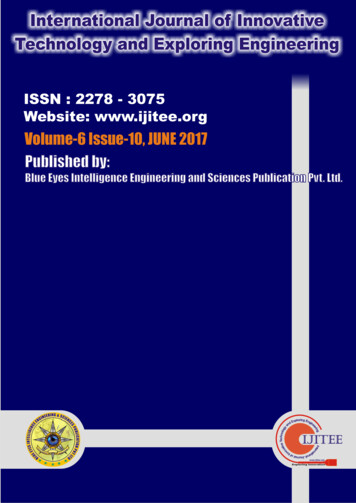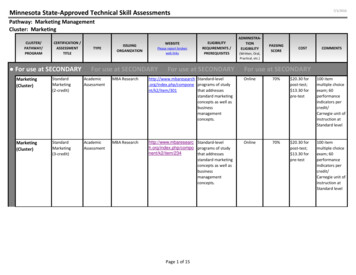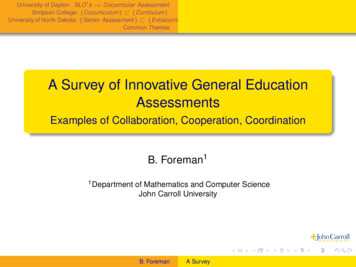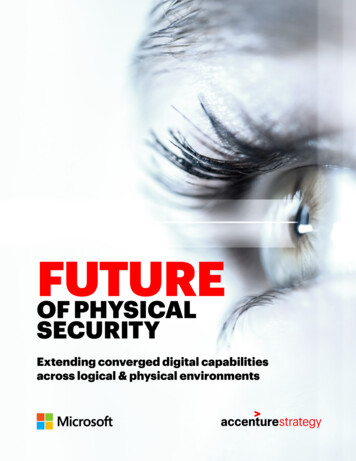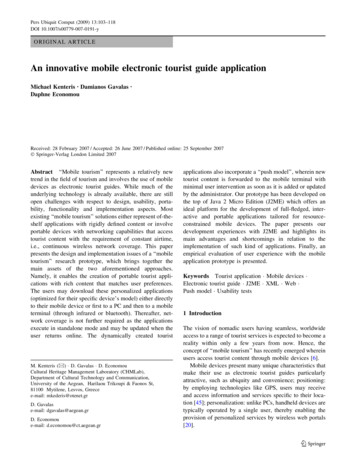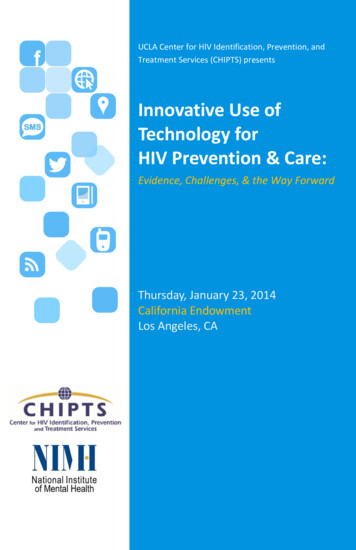
Transcription
fUCLA Center for HIV Identification, Prevention, andTreatment Services (CHIPTS) presentsInnovative Use ofTechnology forHIV Prevention & Care:Evidence, Challenges, & the Way ForwardThursday, January 23, 2014California EndowmentLos Angeles, CA
WelcomeDear Friends and Colleagues,The UCLA Center for HIV Identification, Prevention, and Treatment Services(CHIPTS) is proud to host today’s conference on the “Innovative Use ofTechnology for HIV Prevention and Care: Evidence, Challenges, and the WayForward.” We are very excited about our conference and we hope you are too.With the rapid growth of mobile and digital technology, including tablets,mobile and native applications, and social media, it is undeniable that these arealso impacting the way we deliver prevention and care services to HIV affectedand infected communities. In the coming years, technologies will transformhealth delivery and have the potential to reduce health disparities amongcommunities.We are thrilled by the interest people have shown in this conference. You arehere because of the impact and influence you have on your community. Thepresentations and discussions today were put together to give you insights onthe role that mobile technologies and social media can play in your work andamong your communities, including providing you with diverse perspectiveson whether and how these technologies should be used. We welcome you tothis event, and welcome your participation and discussion on this importanttopic.We also want to acknowledge the National Institute of Mental Health for theirongoing support of CHIPTS (MH058107) and the sponsorships from the UCLAAIDS Institute, UCLA Center for AIDS Research, UCLA Center for Behavioraland Addiction Medicine, UCLA Interdisciplinary and Cross Campus Affairs, andJanssen Pharmaceutical Companies of Johnson & Johnson that made this eventpossible.We hope you enjoy the conference and we look forward to meeting you!Yours truly,The Conference Planning CommitteeNOTE: Videos and powerpoint presentations will be available on the CHIPTSwebsite at http://chipts.ucla.edu after the event.
Agenda8:00 a.m.8:45 a.m.Registration and Continental Breakfast - Redwood RoomWelcome and Opening RemarksSteve Shoptaw, PhD, Co-Director, CHIPTS & Executive Director, CBAM8:50 a.m.Introduction to Technologies for HIV & Conference Goals9:00 a.m.The Way of the Future: Using Technology to Influence HealthBehaviorSean Young, PhD, Core Scientist, CHIPTS & Director of Innovation, CBAMTrends in Health Technology: The Data and Digital ConvergenceIndu Subaiya, MD, MBA, Keynote Speaker, Co-Chairman & CEO, Health 2.0Online Soap Operas, Virtual Clubs, and Hundreds of Text Messages:Innovations in eHealth Approaches to HIV PreventionBrian Mustanski, PhD, Associate Professor of Medical Social Sciences,Northwestern University10:15 a.m.10:30 a.m.BreakInnovation is Here and Now: Technology-Based HIV ResearchSocially Optimized Learning in Virtual Environments (SOLVE):Developing, Evaluating, and Disseminating A Game HIV PreventionIntervention Nationally Over the WebLynn C. Miller, PhD, Professor, USC Department of PsychologyPatient/Client Engagement and Activation Using Smartphone Apps, TextMessaging, Interactive Voice Response, and Mobile/Web CaseManagement PlatformsDallas Swendeman, PhD, MPH, Co-Director, CHIPTS & Assistant Professor,UCLA Department of Psychiatry & Biobehavioral SciencesEngaging Youth in the Digital Age: Tech, Text and ThriveMarguerita Lightfoot, PhD, Professor, UCSF School of Medicine & Chief ofthe Division of Prevention StudiesHIV Prevention is 215 Feet Away: Developing Geosocial NetworkingInterventions for Young Men Who Have Sex With MenIan W. Holloway, PhD, MSW, MPH, Assistant Professor, UCLA Department ofSocial Welfare
Agenda12:00 p.m.1:00 p.m.Lunch & ExhibitsUsing Technology to Engage High-Risk Populations: CommunityExperiencesHow Technology Reduces the Risk-Taking of Homeless YouthEric Rice, PhD, Assistant Professor, USC School of Social WorkEnhancing a Small Group Intervention for Uninsured Women with SocialMediaNina Harawa, PhD, Associate Professor, Charles Drew University of Medicineand ScienceUsing Text Messaging to Reduce Methamphetamine Use and Sexual RiskBehaviors and Increase ART Adherence Among Men Who Have Sex WithMenCathy Reback, PhD, Senior Research Scientist, Friends Research Institute,Inc.2:15 p.m.Policy Panel Discussion: Opportunities and Challenges Related toUsing Technology-based Interventions for HIV Prevention & CareKevin Farrell, LCSW, Panel Moderator, CHIPTS Policy CoreRamin Bastani, Founder/CEO of HULATina Henderson, PhD, Project Manager, JWCH InstituteBrad Sears, JD, Executive Director, UCLA Charles R. Williams InstituteRisa Flynn, Program Manager, Research, Los Angeles Gay & Lesbian Center3:15 p.m.Future Directions and Funding Priorities for HIV and TechnologyBased Research at NIDA and NIMHSusannah Allison, PhD, Program Officer, Division of AIDS Research, NationalInstitute of Mental HealthJacqueline Lloyd, PhD, MSW, Deputy Branch Chief, Prevention ResearchBranch, National Institute on Drug Abuse3:45 p.m.Conference Synthesis and Closing4:00 p.m.Conference AdjournNetworking Reception – Library RoomSean Young, PhD, Core Scientist, CHIPTS & Director of Innovation, CBAM
Presenter’s BiosSteve Shoptaw, PhD is the Executive Director of the UCLACenter for Behavioral and Addiction Medicine (CBAM), andProfessor and Vice Chair for Academic Affairs in the UCLADepartment of Family Medicine. Over the past 22 years, he hasconducted a series of clinical studies in community clinicsettings, primarily on topics that involve developing and testing medical andbehavioral interventions to treat substance abuse and prevent the spread ofHIV. He is also the Co-Director of the Combination Prevention Core of CHIPTSwhich leads research in combination prevention interventions and strategiesthat integrate medical, technology, social media and behavioral advancementsin HIV prevention and care.Sean D. Young, PhD, MS, is an Assistant Professor in theDepartment of Family Medicine and Director of Innovation at theCenter for Behavioral and Addiction Medicine (CBAM) at UCLA.Dr. Young’s work is focused on using social media and mobilehealth technologies to predict and change behavior and improvecommunity and global health. He is the PI of the HOPE UCLA studies, the firsttrials to assess whether online social networks can be used as a technologyplatform to increase HIV testing and retention in care among Los Angelesbased African American and Latino MSM, and Peruvian MSM, in Lima, Peru.Indu Subaiya, MD, MBA is Co-Chairman and CEO of Health 2.0, acompany that promotes, showcases and catalyzes newtechnologies in health care through a worldwide series ofconferences, code-a-thons, prize challenges, and more. Prior toco-founding Health 2.0, she was Entrepreneur-in-Residence atPhysic Ventures, a consumer health and wellness investment fund. She has alsoserved as President of Etude Scientific, a consulting firm in the biotechnologyand consumer health care space, Vice President of Healthcare and BiomedicalResearch at Gerson Lehrman Group, and Director of Outcomes Research atQuorum Consulting.Brian Mustanski, PhD is Associate Professor of Medical SocialSciences and Psychology at Northwestern University andDirector of the IMPACT LGBT Health and Development Program.His work focuses on the health and development of gay, lesbian,bisexual, and transgender (LGBT) youth and the application ofnew media and technology to sexual health promotion and HIV prevention. Hehas received numerous awards, including a William T Grant Scholars Awardand Award for Distinguished Scientific Contribution to LGBT Psychology fromAPA (Div 44) among others.
Presenter’s BiosLynn Carol Miller, PhD is Professor of the Annenberg School ofCommunication and Journalism and of the Department ofPsychology at the University of Southern California. Since 1990she has been funded (e.g., CHRP, NIAID, NIMH) to, and hassuccessfully developed virtual interventions for betterunderstanding and changing risky behaviors of high risk and diversepopulations. Currently, she is the PI of a funded NIMH 5-year R01 to developand test the efficacy of a 3-D animated game with intelligent agents for highrisk young MSM delivered nationally over the web. She is also Co-PI on anNIDA grant examining neural patterns of MSM as they play the NIMH game.Dallas Swendeman, PhD, MPH is Co-Director of CHIPTS andAssistant Professor-in-Residence in the Department of Psychiatryand Biobehavioral Sciences at UCLA. Since 1993 he has workedon evidence-based interventions for people living with HIV in U.S.HIV/AIDS epicenters, community-led structural interventionswith sex workers in India, and with young men, pregnant women, andcommunity health workers in South Africa. He has collaborated with computerscientists, mobile technology companies, and treatment and prevention serviceproviders to develop and evaluate smartphone applications, text-messaging,interactive voice response, and case management platforms to supportHIV/AIDS prevention and treatment goals and programs.Marguerita Lightfoot, PhD is Professor at the UCSF School ofMedicine and Chief of the Division of Prevention Sciences in theDepartment of Medicine. She is a counseling psychologist whoseresearch has included HIV prevention work in the juvenile justicesystem and with runaway and homeless youths in Los Angeles. Afocus of her research with adolescents has been to adapt and utilize interactiveand engaging delivery of HIV preventive activities on computers. She isinterested in developing cost-effective interventions that are easilytranslatable with utility in community settings and utilizes new technologies toengage disenfranchised individuals in health promotion activities.Ian Holloway, PhD, MSW, MPH is an Assistant Professor in theDepartment of Social Welfare at the UCLA Luskin School of PublicAffairs. His research focuses on HIV and substance abuseprevention for vulnerable youth. Dr. Holloway recentlycompleted a NIDA-funded study entitled, "Social Network andContextual Influences of Substance Use and HIV Risk Among Young Men WhoHave Sex With Men.” Dr. Holloway is interested in developing technologybased geosocial networking interventions to prevent STI/HIV transmissionamong diverse sexual minority populations.
Presenter’s BiosNina Harawa, PhD, MPH is an Associate Professor with theCharles R. Drew University of Medicine and Science and anAdjunct Associate Professor at UCLA. Trained as anepidemiologist, her research involves both documenting andunderstanding trends in the distribution of HIV and other STIsand developing effective prevention interventions. She has conducted and ledstudies examining the prevalence of HIV infection and risky behaviors in avariety of at-risk populations. Dr. Harawa has an ongoing HIV preventionstudies for African American men who have sex with men and women and forAfrican American women in partnerships with high-risk men.Eric Rice, PhD is an Assistant Professor with the USC School ofSocial Work faculty since 2009. He is an expert in social networktheory, social network analysis, and the application of socialnetwork methods to HIV prevention research. His current workfocuses on developing an online social networking, HIVprevention program for homeless youth funded through a grant from NationalInstitute of Mental Health. It brings social network theories and models to bearon the social problems faced by homeless youth and families affected byHIV/AIDS.Cathy J. Reback, PhD is a Research Sociologist with UCLAIntegrated Substance Abuse Program and a Senior ResearchScientist with Friends Research Institute. She is PI of a NIDAfunded study to evaluate differential immediate and sustainedeffects of transmitting text messages by peer health educators,versus by automation, compared to an assessment-only condition with out-oftreatment, meth-using MSM for reductions of meth use and HIV sexual riskbehaviors and increased ART medication adherence. She also has been fundedby NIDA to develop a treatment intervention “app” for MSM meth users and isworking on a study that utilizes Ecological Momentary Assessments on cellphones to optimize meth abuse treatment outcomes among MSM.Kevin Farrell, MSW, LCSW is a Project Director with the CHIPTSPolicy Core. Prior to CHIPTS, he served for five years as theBranch Chief for HIV Education and Prevention Services at theCalifornia Office of AIDS, a division of the California Departmentof Public Health and Section Chief for the HIV Counseling andTesting Program. He also worked in the Care Branch at the California Office ofAIDS as a member of the team that wrote the annual Ryan White Applicationfor funding from Title II. He is a past member of the Sonoma County AIDSCommission and the Los Angeles County Prevention Planning Council.
Presenter’s BiosRamin Bastani is CEO and Founder of Hula, formerly known asQpid.me. Hula makes getting for STDs suck less and helps peoplehave more (safe) sex. He’s spoken at the National Library ofMedicine, Stanford, Health 2.0 and been grilled on the MikeHuckabee Radio Show. He might be the safest man to have sexwith in America, given how often he gets tested.Tina Henderson, PhD is the Program Manager for the HRSAfunded SPNS Women of Color Initiative at the JWCH Institutegrantee demonstration site in Los Angeles. This linkage to careresearch project is an integration of social and medical servicesfor unstably housed and homeless HIV-positive women of colorliving in the LA’s Skid Row area. Dr. Henderson's research interests are in riskreduction interventions and addressing health disparities such as institutionaland structural barriers, including religion and spirituality, which can furthercontribute to health disparities.Brad Sears, JD is the Executive Director of the Williams Instituteand Assistant Dean at the UCLA School of Law. He has publisheda number of research studies and articles, primarily ondiscrimination against LGBT people in the workplace and HIVdiscrimination in health care. Mr. Sears has given hundreds ofacademic and community presentations on HIV/AIDS and LGBT legal issues. Hehas testified before Congress and a number of state legislatures, authoredamicus briefs in key court cases, helped to draft state and federal legislation,and been cited by a number of media including the New York Times, the LosAngeles Times, National Public Radio, and CNN. Sears has received Being AliveLos Angeles’ Volunteer of the Year Award and, in 2009, was recognized onAdvocate’s Magazine’s “40 Under 40” list.Risa P. Flynn is Program Manager for the Clinical ResearchProgram in the Health and Mental Health Services Department atthe LA Gay and Lesbian Center, where she has focused onSTI/HIV/AIDS prevention, intervention, and treatment researchfor the last 4 years. Her research management and sciencecommunications expertise has been concentrated on issues in public health,health disparities research, and clinical research, with an emphasis oncommunity based, translational research methods.
Presenter’s BiosSusannah Allison, PhD is a Program Officer at the NationalInstitute of Mental Health within the Infants, Children andAdolescents Research Program in the Division of AIDSResearch. The program supports neurobehavioral andpsychosocial studies involving infants, children, and adolescentsthat are infected with HIV, affected by HIV, or at-risk for HIV. Prior to workingat NIMH, Dr. Allison worked with children and families infected and affected byHIV/AIDS in Baltimore, Miami and Washington, DC. She completed hergraduate studies at the George Washington University where she received aPhD in Clinical Child Psychology with an emphasis in child health psychology.Jacqueline Lloyd, PhD, MSW is Deputy Branch Chief and HealthScientist Administrator in the Prevention Research Branch in theDivision of Epidemiology, Services and Prevention Research atthe National Institute on Drug Abuse/National Institutes onHealth. Dr. Lloyd received a doctoral degree from Johns HopkinsUniversity School of Hygiene and Public Health, Department of Mental Hygieneand a Master in Social Work from the University of Connecticut, School of SocialWork. Dr. Lloyd’s program areas at NIDA include drug abuse, sexual and HIVprevention for at-risk adolescents and young adults.
ExhibitorsLos Angeles Women’sHIV/AIDS Task ForceMedia PartnerPlanning Members & StaffPlanning MembersKevin Farrell, MSW, LCSWIan Holloway, PhD, MSW, MPHUyen Kao, MPHArleen Leibowitz, PhDSteve Shoptaw, PhDDallas Swendeman, PhD, MPHSean Young, PhD, MSSupport StaffJennifer Baughman, CBAMJulia De Palma, CBAMKiesha McCurtis, CBAMAmy Ragsdale, CHIPTSKenny Sim, CHIPTSAdriane Wynn, CHIPTS
Sponsors & PartnersInterdisciplinary & Cross Campus Affairs
Notes
prevention program for homeless youth funded through a grant from National Institute of Mental Health. It brings social network theories and models to bear on the social problems faced by homeless youth and families affected by HIV/AIDS. Cathy J. Reback, PhD is a Research Sociologist with UCLA Integrated Substance Abuse Program and a Senior .
